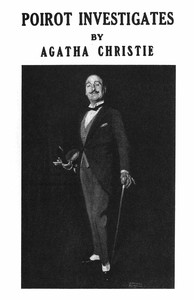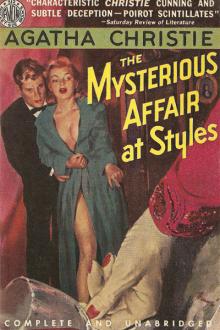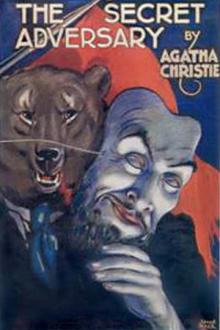Poirot Investigates by Agatha Christie (10 ebook reader .TXT) 📗

- Author: Agatha Christie
Book online «Poirot Investigates by Agatha Christie (10 ebook reader .TXT) 📗». Author Agatha Christie
I did so. While we were waiting for it to be answered, Poirot walked up and down, looking about him approvingly.
“A man of method this Mr. Marsh. See how neatly the packets of papers are docketed; then the key to each drawer has its ivory label—so has the key of the china cabinet on the wall; and see with what precision the china within is arranged. It rejoices the heart. Nothing here offends the eye——”
He came to an abrupt pause, as his eye was caught by the key of the desk itself, to which a dirty envelope was affixed. Poirot frowned at it and withdrew it from the lock. On it were scrawled the words: “Key of Roll Top Desk,” in a crabbed handwriting, quite unlike the neat superscriptions on the other keys.
“An alien note,” said Poirot, frowning. “I could swear that here we have no longer the personality of Mr. Marsh. But who else has been in the house? Only Miss Marsh, and she, if I mistake not, is also a young lady of method and order.”
Baker came in answer to the bell.
“Will you fetch madame your wife, and answer a few questions?”
Baker departed, and in a few moments returned with Mrs. Baker, wiping her hands on her apron and beaming all over her face.
In a few clear words Poirot set forth the object of his mission. The Bakers were immediately sympathetic.
“Us don’t want to see Miss Violet done out of what’s hers,” declared the woman. “Cruel hard ’twould be for hospitals to get it all.”
Poirot proceeded with his questions. Yes, Mr. and Mrs. Baker remembered perfectly witnessing the will. Baker had previously been sent into the neighbouring town to get two printed will-forms.
“Two?” said Poirot sharply.
“Yes, sir, for safety like, I suppose, in case he should spoil one—and sure enough, so he did do. Us had signed one——”
“What time of day was that?”
Baker scratched his head, but his wife was quicker.
“Why, to be sure, I’d just put the milk on for the cocoa at eleven. Don’t ee remember? It had all boiled over on the stove when us got back to kitchen.”
“And afterwards?”
“’Twould be about an hour later. Us had to go in again. ‘I’ve made a mistake,’ says old master, ‘had to tear the whole thing up. I’ll trouble you to sign again,’ and us did. And afterwards master give us a tidy sum of money each. ‘I’ve left you nothing in my will,’ says he, ‘but each year I live you’ll have this to be a nest-egg when I’m gone’; and sure enough, so he did.”
Poirot reflected.
“After you had signed the second time, what did Mr. Marsh do? Do you know?”
“Went out to the village to pay tradesmen’s books.”
That did not seem very promising. Poirot tried another tack. He held out the key of the desk.
“Is that your master’s writing?”
I may have imagined it, but I fancied that a moment or two elapsed before Baker replied: “Yes, sir, it is.”
“He’s lying,” I thought. “But why?”
“Has your master let the house?—have there been any strangers in it during the last three years?”
“No, sir.”
“No visitors?”
“Only Miss Violet.”
“No strangers of any kind been inside this room?”
“No, sir.”
“You forget the workmen, Jim,” his wife reminded him.
“Workmen?” Poirot wheeled round on her. “What workmen?”
The woman explained that about two years and a half ago workmen had been in the house to do certain repairs. She was quite vague as to what the repairs were. Her view seemed to be that the whole thing was a fad of her master’s and quite unnecessary. Part of the time the workmen had been in the study; but what they had done there she could not say, as her master had not let either of them into the room whilst the work was in progress. Unfortunately, they could not remember the name of the firm employed, beyond the fact that it was a Plymouth one.
“We progress, Hastings,” said Poirot, rubbing his hands as the Bakers left the room. “Clearly he made a second will and then had workmen from Plymouth in to make a suitable hiding-place. Instead of wasting time taking up the floor and tapping the walls, we will go to Plymouth.”
With a little trouble, we were able to get the information we wanted. After one or two essays, we found the firm employed by Mr. Marsh.
Their employees had all been with them many years, and it was easy to find the two men who had worked under Mr. Marsh’s orders. They remembered the job perfectly. Amongst various other minor jobs, they had taken up one of the bricks of the old-fashioned fireplace, made a cavity beneath, and so cut the brick that it was impossible to see the join. By pressing on the second brick from the end, the whole thing was raised. It had been quite a complicated piece of work, and the old gentleman had been very fussy about it. Our informant was a man called Coghan, a big, gaunt man with a grizzled moustache. He seemed an intelligent fellow.
We returned to Crabtree Manor in high spirits, and, locking the study door, proceeded to put our newly acquired knowledge into effect. It was impossible to see any sign on the bricks, but when we pressed in the manner indicated, a deep cavity was at once disclosed.
Eagerly Poirot plunged in his hand. Suddenly his face fell from complacent elation to consternation. All he held was a charred fragment of stiff paper. But for it, the cavity was empty.
“Sacré!” cried Poirot angrily. “Some one has been before us.”
We examined the scrap of paper anxiously. Clearly it was a fragment of what we sought. A portion of Baker’s signature remained, but no indication of what the terms of the will had been.
Poirot sat back on his heels. His expression would have been comical if we had not been so overcome.
“I understand it not,” he growled. “Who destroyed this? And what was their object?”
“The Bakers?” I suggested.
“Pourquoi? Neither will makes any provision for them, and they are more likely to be kept on with Miss Marsh than if the place became the property of a hospital. How could it be to anyone’s advantage to destroy the will? The hospitals benefit—yes; but one cannot suspect institutions.”
“Perhaps the old man changed his mind and destroyed it himself,” I suggested.
Poirot rose to his feet, dusting his knees with his usual care.
“That may be,” he admitted. “One of your more sensible observations, Hastings. Well, we can do no more here. We have done all that mortal man can do. We have successfully pitted our wits against the late Andrew Marsh’s; but, unfortunately, his niece is no better off for our success.”
By driving to the station at once, we were just able to catch a train to London, though not the principal express. Poirot was sad and dissatisfied. For my part, I was tired and dozed in a corner. Suddenly, as we were just moving out of Taunton, Poirot uttered a piercing squeal.
“Vite, Hastings! Awake and jump! But jump I say!”
Before I knew where I was we were standing on the platform, bareheaded and minus our valises, whilst the train disappeared into the night. I was furious. But Poirot paid no attention.
“Imbecile that I have been!” he cried. “Triple imbecile! Not again will I vaunt my little grey cells!”
“That’s a good job at any rate,” I said grumpily. “But what is this all about?”
As usual, when following out his own ideas, Poirot paid absolutely no attention to me.
“The tradesmen’s books—I have left them entirely out of account! Yes, but where? Where? Never mind, I cannot be mistaken. We must return at once.”
Easier said than done. We managed to get a slow train to Exeter, and there Poirot hired a car. We arrived back at Crabtree Manor in the small hours of the morning. I pass over the bewilderment of the Bakers when we had at last aroused them. Paying no attention to anybody, Poirot strode at once to the study.
“I have been, not a triple imbecile, but thirty-six times one, my friend,” he deigned to remark. “Now, behold!”
Going straight to the desk, he drew out the key, and detached the envelope from it. I stared at him stupidly. How could he possibly hope to find a big will-form in that tiny envelope? With great care he cut open the envelope, laying it out flat. Then he lighted the fire and held the plain inside surface of the envelope to the flame. In a few minutes faint characters began to appear.
“Look, mon ami!” cried Poirot in triumph.
I looked. There were just a few lines of faint writing stating briefly that he left everything to his niece, Violet Marsh. It was dated March 25, 12.30 p.m., and witnessed by Albert Pike, confectioner, and Jessie Pike, married woman.
“But is it legal?” I gasped.
“As far as I know, there is no law against writing your will in a blend of disappearing and sympathetic ink. The intention of the testator is clear, and the beneficiary is his only living relation. But the cleverness of him! He foresaw every step that a searcher would take—that I, miserable imbecile, took. He gets two will-forms, makes the servants sign twice, then sallies out with his will written on the inside of a dirty envelope and a fountain-pen containing his little ink mixture. On some excuse he gets the confectioner and his wife to sign their names under his own signature, then he ties it to the key of his desk and chuckles to himself. If his niece sees through his little ruse, she will have justified her choice of life and elaborate education, and be thoroughly welcome to his money.”
“She didn’t see through it, did she?” I said slowly. “It seems rather unfair. The old man really won.”
“But no, Hastings. It is your wits that go astray. Miss Marsh proved the astuteness of her wits and the value of the higher education for women by at once putting the matter in my hands. Always employ the expert. She has amply proved her right to the money.”
I wonder—I very much wonder—what old Andrew Marsh would have thought!





Comments (0)